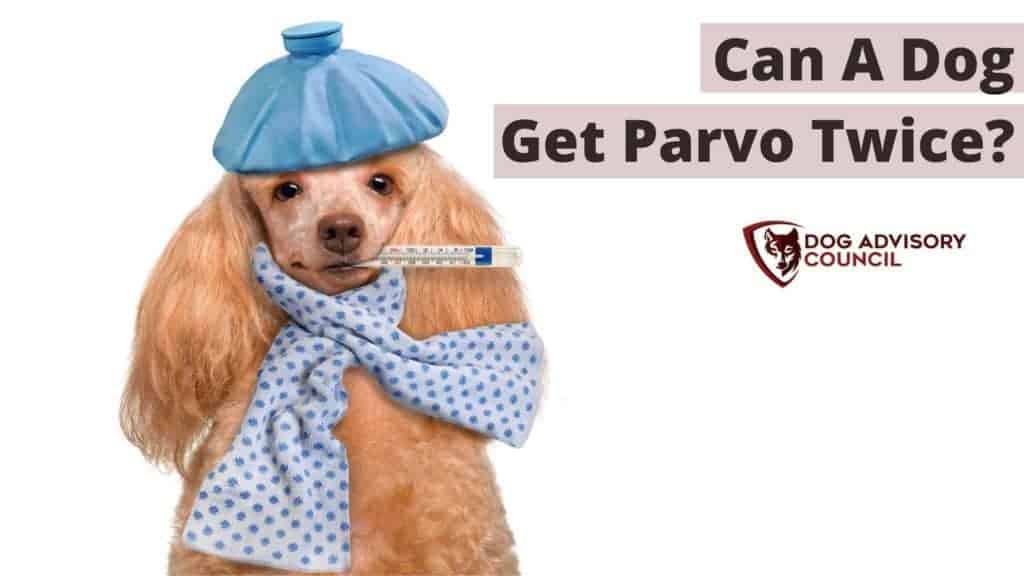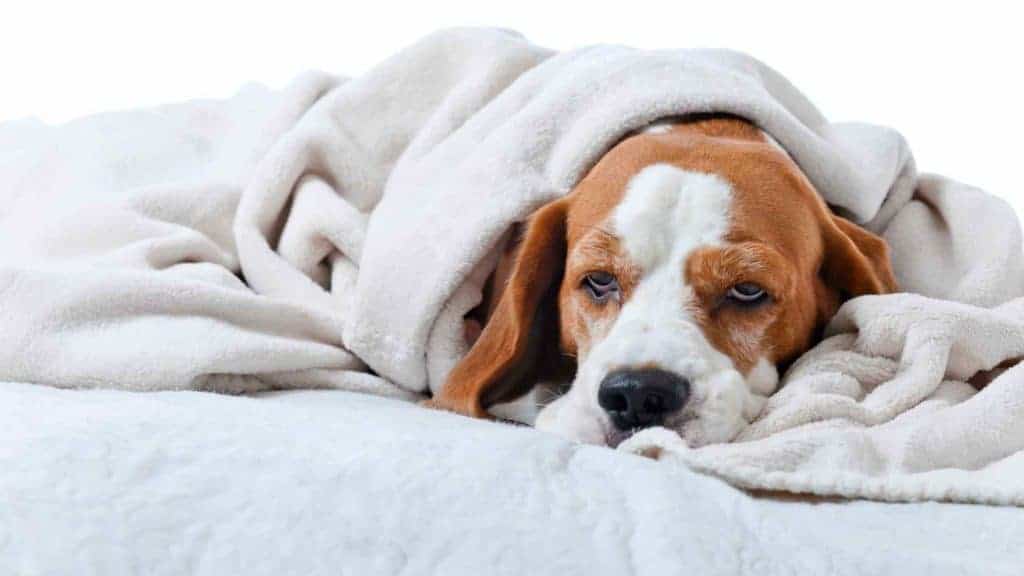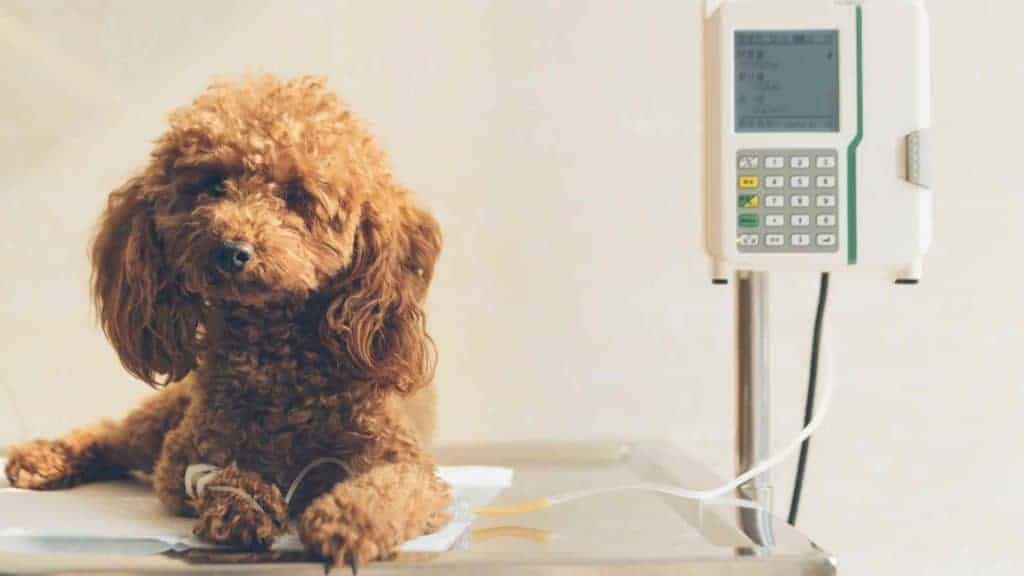
Dealing with a sick dog is no pet owner’s idea of a good time, but it does happen. One of the sicknesses you absolutely should know about is Parvovirus.
Here’s what you should know for your dog’s optimal health.
Technically, a dog is capable of getting Parvovirus twice, but it is very rare.
Immunity lasts several years and offers good protection for your dog. However, the virus itself can live for over a year in your home, making other dogs capable of catching the virus.
Below, we’ve gone over Parvovirus risk, the infection and treatment process, prognosis, and how to keep your dog safe from getting it in the first place.
What is Parvovirus?
This is a disease in dogs that is considered amongst the most serious because it is highly contagious and has a high mortality rate if it isn’t treated quickly and professionally.
This is a relatively new virus and has been around since the late 1970s. Professionals still learn a lot about it, but vet care treatments and vaccines are now considered standard.
Can a puppy get Parvo twice?
Both puppies and dogs are technically capable of getting Parvo twice, but it really depends on which strain they have and how long their immunity lasts.
For example, a puppy who recovers fully from the virus can approximately have immunity for 3-7 years. After that, they’ll need to get a booster shot to jumpstart their immunity again.
Some find that puppies who survive Parvo as young puppies never get it again, even without a booster shot. We’ll talk more about that later on.
An adult dog is much the same way, but the difference will be when they get the virus. If a dog is 8 years old, it could have immunity for the rest of its life because its remaining years will be shorter than a puppy!
Are there exceptions?
Unfortunately, there are some exceptions to this rule. Firstly, dogs can contract Parvo again and struggle with it even with proper vaccination and diligence. Most won’t survive the second round, unfortunately, since it is a severe virus.
This is because approximately 0.001% of dogs cannot gain immunity to a virus through a vaccine.
In either a situation where they get their immunity from surviving it the first time or a vaccine, their body won’t build up immunity. So, if they come into contact with it in the future, it’s like they don’t have any immunity at all.
This is a very rare occurrence, however, as the percentage will tell you!
Can a vaccinated dog get Parvo?
Yes, a vaccinated dog can get the Parvovirus. This is because there are multiple strains of the virus itself. Like many viruses, such as the flu, there are many variants and changes over the years.
While the vaccine is constantly improving and changing, there will always be those years where there is a gap.
There’s also the fact that all dogs, whether they get Parvo or are given the vaccine as pups, will need a booster shot every so often. To guarantee they maintain their immunity levels and stay healthy.
How do dogs get infected with Parvovirus?
Parvovirus is very contagious, so it’s pretty easy for dogs to pick it up.
Dogs can pick it up from sniffing or licking with each other. Or, they can pick it up from sniffing or venturing around on a dog’s property that is actively shedding the virus. They can also pick it up from humans who come into contact with a dog that has Parvo.
What are the first signs of Parvo in a dog?
Parvo tends to set in pretty quickly in dogs, making early detection very challenging.
The first signs of Parvo in dogs are that they stop eating, start vomiting regularly, and develop severe diarrhea. This last symptom often means that the gut wall has weakened and perforated, leading to bloody diarrhea and further dehydration.
Parvo works very quickly in dogs, and a dog can go from fine to critical condition in a matter of a day or even hours, depending on the dog’s overall health.
In cases where dogs don’t survive, the usual cause of death is severe dehydration, which comes from the inability to take in water, severe diarrhea, and perforations which worsen the dehydration. If the dehydration can’t be controlled, it can lead to organ failure.

How long will Parvo last for my dog?
Parvo tends to last about 10 days, with intense, round-the-clock care to monitor hydration. Within these 10 days, the dog will be able to fight off the virus, or they won’t. Once they have passed, your dog will start to recover pretty quickly.
Since most of the danger with Parvo is from the complications caused by dehydration, your dog will quickly recover once he can eat and drink again at average rates.
It may take him a few days to get his energy back, of course, but the rebound will be pretty reassuring.
There are no long-term complications with Parvo in most cases where the dog is otherwise in good health.
In rare cases, your dog may have a very sensitive stomach and need specialized food or probiotic supplements to help ease digestion.
How can I treat my dog at home for Parvo?
A dog can be treated at home for Parvo, technically speaking. As long as you can give him fluids and treatment, the care can happen anywhere.
However, the reality is that over 80% of dogs that don’t get in-hospital care won’t survive, dying mainly of severe dehydration.
This is because the hospitals can use solutions like IV fluids and offer medications that help support their bodies while fighting the virus.
Even in hospitals, the survival rate of dogs with Parvo is at 80%. Suppose you take away the professional, round-the-clock care. In that case, this number will rise quickly, not to mention that it can be very distressing for the pet parents to have to watch their dog decline.
Can a dog survive Parvo without treatment?
Technically, yes. However, experts agree that medical treatment is strongly recommended for the wellbeing of the dog.
As mentioned, a hospital is a 24-hour environment. Here highly trained specialists and doctors can give fluids, monitor for a decline, administer antibiotics, and even a plasma transfusion to assist your dog recovery.
This will help them recover easier and faster in some situations. Treatment and hospitalization will always mean the best chances of survival.
Does Parvovirus affect older dogs?
While puppies are considered to be the most susceptible, senior dogs can be impacted by Parvo.
Even if they are up-to-date on vaccinations and aren’t potentially putting themselves at risk (more on that later), they can still contract it, even if it is rare.
Senior dogs will have a low survival rate simply because their bodies are tired and weak and will not fight off the virus as easily as a healthy adult dog.
How come puppies are so susceptible to Parvo?
Puppies between 2-6 months are considered at the highest risk simply because they take several vaccinations rounds.
Between each round, the puppy can still contract Parvo and must stay away from Parvo-positive dogs until they’ve passed the incubation time for their last vaccination.
The other thing is that puppies are still growing and developing, so their immunity will be lower overall. They won’t be able to fight off the virus as safely or as effectively as a mature, fully-grown dog.
What factors impact my dog’s immunity?
All dogs who contract Parvo will struggle with it, no matter what. Certain breeds are more susceptible to it, such as Rottweilers.
However, contributing factors enhancing your dog’s changes include:
- A healthy diet
- Age and genetics
- Immune system complications of weaknesses
- Early detection
How to prevent my dog from getting Parvo
If you’re feeling the fear right now, you certainly aren’t alone. Parvo is always a severe disease for any responsible pet parent, and it’s essential to take it seriously when looking at preventative care!
So, here are some prevention tips:
- Make sure your dog gets all of its vaccines and any booster shots
- Consider an immunity test to check antibody levels
- Keep up to date on local outbreaks
- Make sure all of your dog’s playmates have their vaccinations
- Avoid visiting homes or people/pets where there is a confirmed Parvo outbreak
Make sure your dog gets all of its vaccines and any booster shots
Sure, vaccines are an extra expense, but they’re crucial to protecting your dog’s long-term health!
Keep a record of what your dog has when he needs new vaccines, and bring it with you to every vet appointment.
Consider an immunity test to check antibody levels
If your dog is a superhero and survived Parvo earlier in life (congratulations!), then you’ll want to make sure that your vet knows this.
Your vet will want to do an immunity check for Parvo every few years by checking the antibodies in your dog. This will let your vet know when they need a booster shot to compliment their natural immunity.
Keep up to date on local outbreaks
Just like the flu and other viruses, local outbreaks are common with dogs. Your vet is a great resource to ask if they’ve heard of any outbreaks. You can also find chatter online in social media groups and dog-oriented forums.
If there is an outbreak, you’ll want to be very careful to keep your dog as isolated as possible from other dogs, especially in public places like dog parks.
You’ll also want to double-check to make sure that your dog isn’t due for a booster shot for his immunity. If he is, make it a priority!
Make sure all of your dog’s playmates have their vaccinations
When planning playdates at any point in your dog’s life, you’ll want to make sure that they all have their vaccinations.
A group of vaccinated dogs will be the best way to help make sure that everyone in that group stays safe and sound.
Avoid visiting homes or people/pets where there is a confirmed Parvo outbreak
If a dog gets Parvo, you’ll need to avoid visiting that dog, their family, etc., for a long time. How long is long? As long as possible, ideally.
Even after a dog has recovered, Parvo is still active and can be shed in feces and more for 6 weeks. The virus itself can survive for literal years on-premises or property, too.
Many responsible dog owners will actually have their home professionally cleaned from top to bottom after 6 weeks have passed.
This is a great way to make sure that you keep all other household pets and any visiting furry friends as safe as possible.
If your dog isn’t vaccinated against Parvo, you’ll want to avoid taking him to visit a Parvo-positive household for several years just to make sure that there is no live virus still on the property.
Of course, vaccination is always going to be a better and more realistic option!

In summary
Parvovirus is a fast-acting, highly contagious virus in dogs that attacks the intestine and digestive tract. It is a severe illness that sets in very quickly and can be challenging for dogs to survive.
Once recovered, it’s very rare for dogs to get Parvo twice. Though, it is possible. Proper care and prevention are both crucial to protect your dog.
No matter how you look at it, the Parvovirus is a severe illness to know about as a responsible and loving pet parent, no matter how scary it may be to do so.
Know someone that needs to hear all of this? Consider sharing this with them so that you can both do what you have to do to keep your pets safe!
